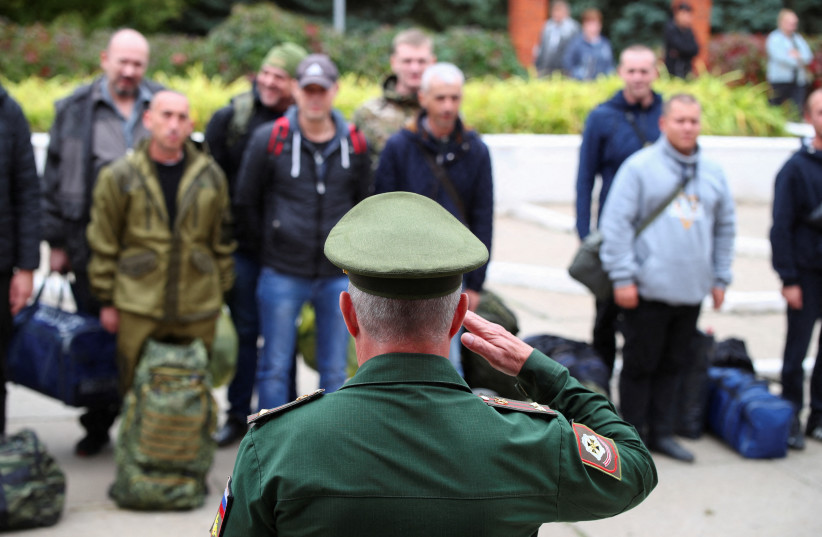The military reservists drafted as part of Russian President Vladimir Putin's partial mobilization are poorly prepared and lack proper military gear for combat in Ukraine, according to Western and Ukrainian intelligence agencies.
CIA Director Williams Burns told CBS Evening News on Tuesday that even if Putin succeeded in mobilizing 300,000 soldiers, "many of whom are not going to be well trained, many of whom are not going to have the kind of equipment that they need or the logistical support that they need as well."
The UK Defense Ministry said on Monday in an intelligence update that "Unlike most Western armies, the Russian military provides low-level, initial training to soldiers within their designated operational units, rather than in dedicated training establishments."
Normally Russian brigades would help in the training process, but these units were already deployed, said the ministry.
"Many of the drafted troops will not have had any military experience for some years," warned the UK Defense Ministry. "The lack of military trainers, and the haste with which Russia has started the mobilization, suggests that many of the drafted troops will deploy to the front line with minimal relevant preparation. They are likely to suffer a high attrition rate."

Mykhailo Podolyak, adviser to the head of the Office of the President of Ukraine, described to Pravda how Ukraine had pursued a policy of quality, and Russia quality.
"Unlike the Russians, who will once again send a mass of untrained reserves to the battlefield to show their numbers, it is much more important for us to have well-trained specialists," said Podolyak.
However, as Burns told CBS, manpower was just one of the issue facing the Russian military.
"Russia will now face an administrative and logistical challenge to provide training for the troops," the UK Defense Ministry said on Monday.
Russian troops sorely underequipped
The Insider reported on Tuesday that despite assurances that troops would be given the equipment they need, lists of recommender gear to be brought by reservists included armor plate carriers, helmets, hydrogen peroxide, tourniquets, tampons to act as bandages.
Newly mobilized soldiers have been given rusty AK-47 and AKM Kalashnikov rifles, according to September 24 viral videos translated by The Insider. The soldiers were in an armored unit, and told that they would not need rifles if they have tanks.
On Thursday, Interfax report that the production of Kalashnikov small arms had increased by 40% in 2022. Part of this came from civilian and foreign demands
"Our priority task is the timely and high-quality fulfillment of obligations for the supply of military products to the Ministry of Defense of the Russian Federation. Ensuring the country's defense capability, especially in the current conditions, is a task that all divisions of the enterprise, without exception, are aimed at," said Kalashnikov head Alan Lushnikov.
A Russian government chatbot provided a list of items mobilized soldiers would be provided with small arms and could not bring there own. They could however, wrote Explain.RF, that one could bring night vision, rifle scopes, thermal gear and quadcopters. While it is not uncommon for soldiers in other militaries to bring some of these items on deployment, it is unusual to allow the use of civilian drones.
On Tuesday, Russian state media outlet TASS reported that Russian soldiers deployed in Ukraine were in need of reconnaissance drones and loitering munitions. Civilian quadcopters have been used in asymmetric conflict for reconnaissance, and more recently have even been modified by Ukrainians to drop munitions.
Russia has been grappling with supply and logistical issues since the beginning of the war. In the first phase, Russian movements sent deep into Ukrainian territory were stymied by overextended supply units, which were targeted by Ukrainian forces.
Even in the initial invasion, soldiers were sent with spoiled rations and limited ammunition. The counter losses of vehicles and munitions, the military has been removing old gear from storage and refurbishing it. Soviet military gear as old as from the 1960s has been returned to service.
They had also opened refurbishing and repair sites for damaged and captured Ukrainian vehicles in the occupied territories. Some of these efforts have been hindered by corruption, with some formerly stored vehicles missing vital parts.
Production of new equipment has been limited by the reliance by Russia's defense ministry on foreign materials and electronics.
Russia has turned to foreign supplies such as Iran for drones and North Korea for munitions to keep up with the demands of the war.
